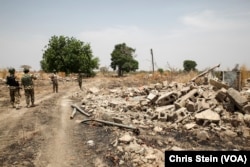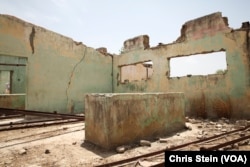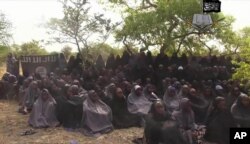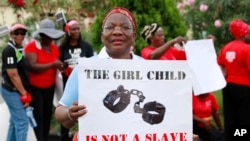Two years after Islamist militants kidnapped more than 200 schoolgirls in northern Nigeria, a new video purporting to show the missing girls just four months ago has given parents hope that their children are still alive.
A mother said she recognized several of the girls. They lived in her neighborhood.
“It is real. They are the ones in that video. They have changed. Two years ago, they were not like this. But today, they are two years older. I know them. They have changed,” said Esther Yakubu, visibly holding back tears as she prepared to march with the Bring Back Our Girls movement in Abuja Thursday, the two-year anniversary of the abduction.
Until now, there has been almost no news on the 219 girls taken by Boko Haram militants in 2014 from a school in the town of Chibok, which sparked global condemnation, street protests in Nigeria and offers of help finding the girls from the country’s allies.
A video that emerged on Wednesday, which shows 15 of the girls and may have been filmed in December, is the first sign of the abductees since they appeared in a Boko Haram propaganda video shortly after their kidnapping.
The new video shows the girls, speaking in the Hausa and Kibaku languages, responding to questions from an unseen interrogator, who asks their names and where they were taken from.
But Minister of Information and Culture Lai Mohammed said he was wary of the video, which was first broadcast by CNN.
False leads
The government has received numerous false leads on the girls’ whereabouts since their abduction, including a similar video last July.
While a girl in the video says they are being filmed on December 25 of last year, Mohammed says it’s unclear when the video was actually shot.
"We are also a bit worried and concerned that, two years after captivity, they would be under no stress whatsoever, they would not have changed physically," he said, referring to the girls shown in the clip. "But despite that, we are still reaching out… We would want more evidence that this video is credible."
The new video is not the only recent sign of the girls. Since January, two parents of missing girls have received phone calls from their abducted daughters’ cellphone numbers, according to Yakubu Nkeki, chairman Abducted Chibok Girls Parents Movement for Rescue.
On the other end of the line on both calls were unknown men, who told the parents that the phone belonged to their wives, Nkeki said.
But in Chibok, some relatives are suspicious of the recent development. The past two years have been filled with rumors that the girls had turned up somewhere in Nigeria’s northeast or in one of the neighboring countries, said Philip Yama, whose sister Margaret Yama was abducted.
“I can’t believe it until I saw these girls with my own eyes,” said Yama, who hasn’t seen the video.
Feel neglected
Many in the northeastern town say they feel neglected. While the insurgents burnt some of the dormitories in the course of the raid, the school was later demolished by the government, which told them they’d build them a new one.
Two years later, they still have no school, and students have either dropped out or relocated elsewhere to continue their studies.
That scene has played out across the northeast, which has been ravaged by fighting between Nigeria’s military and Boko Haram.
A Human Rights Watch report released earlier this week says Boko Haram has destroyed more than 2,000 schools, killed 611 teachers and deprived more than one million children of education since 2009.
In recent years, the group has started relying on children to fill the ranks of its suicide bombers. A report from the U.N. Children’s Fund released this week says 44 children were involved in suicide attacks last year, up from only four in 2014.
Chibok is no stranger to these bombings. A triple suicide bombing in the town killed at least 10 people in January.
The stress of the kidnapping and insurgency has taken a toll on the community.
Nkeki said 18 parents of abducted girls have died the since kidnapping. Boko Haram killed some, while Nkeki said others succumbed to illnesses or stress-related ailments brought by the pain of waiting for their daughters’ return.
PHOTO GALLERY: Two years later, most Chibok girls still missing








